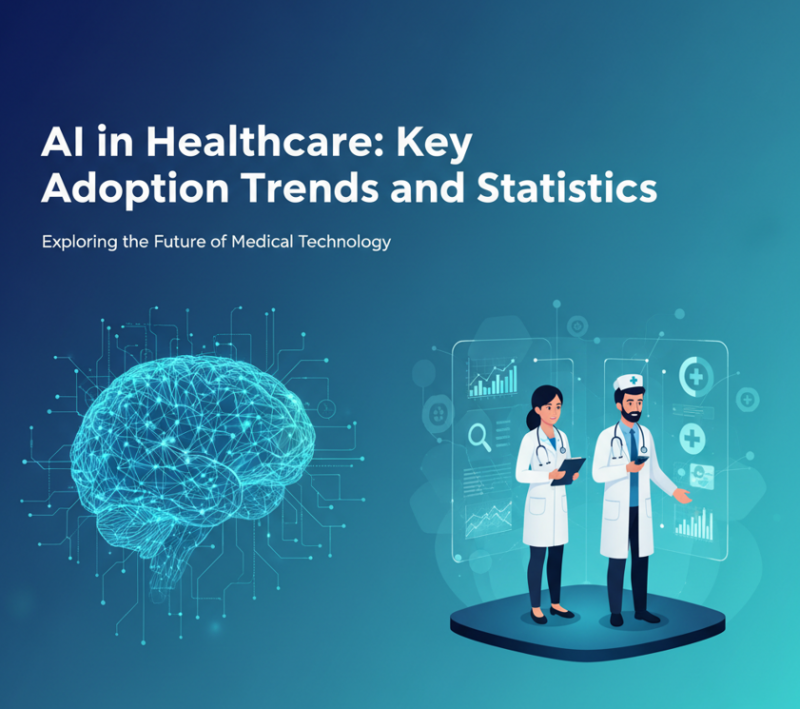Do you want to know the key adoption trends and statistics related to artificial intelligence in healthcare? Do you want to understand how AI is revolutionizing and will continue to revolutionize the healthcare industry? Here’s the detailed blog you are looking for. The blog contains detailed information related to key adoption trends and statistics. Let’s explore.
Key Adoption Trends of AI in Healthcare
Healthcare is an industry that has experienced a significant number of benefits and changes with the evolution of artificial intelligence. With AI in healthcare, we are able to monitor our vitals at our fingertips through smart wearables. The diagnostics process is also partially or fully automated now, promoting better care. With continuous advancements, there are some key adoption trends of AI in healthcare. Let’s take a look at them.
Integration into Clinical Workflows
One of the most promising and followed AI adoption trends is its integration into clinical workflows. With each passing day, more and more healthcare organizations are integrating AI tools into various systems, including electronic health records (EHR), hospital workflows, and telemedicine platforms. It makes AI more than just a standalone application.
AI-Powered Digital Therapeutics
Digital therapeutics are now more accessible, thanks to AI intervention. AI developers’ ability to constantly innovate has led to many AI trends in healthcare, but AI-powered digital therapeutics ranks among the best. Such interventions help professionals deliver personalized and evidence-based treatment, offering a better alternative to traditional therapies.
AI-Enhanced Imaging and Diagnostics
With AI integration, both medical imaging and diagnostics have become more accurate. Medical imaging has been revolutionized entirely with the help of AI. According to multiple research reports, AI can improve cancer detection rates by 15 to 20%. In radiology, AI detects fractures, hemorrhages, and tumors more accurately compared to radiologists.
Integration in Clinical Decision
Healthcare professionals assisted by AI make faster, accurate, and evidence-based clinical decisions. Here, artificial intelligence algorithms analyze the entire medical data of patients. What separates them from rule-based systems is that they continuously learn from a wide range of datasets such as electronic health records, lab results, genomics, and more.
AI in Healthcare: Statistics
AI in healthcare is one of the fastest-growing industries, making and breaking records every day. Machine learning and artificial intelligence are transforming the ways of treatment, making it more personalized with the patient’s medical history, images, and various historical data. Diagnostics have become more accurate due to the integration of AI and ML in healthcare. Let’s take a look at some of the AI adoption statistics in healthcare.
- According to a report by market.us, the value of generative AI in healthcare was around USD 0.8 billion in 2022 and is expected to reach USD 17.2 billion in 2032.
- The AI in healthcare market is forecasted to register the highest CAGR (compound annual growth rate) of 37% between 2023 and 2032.
- It is expected that the annual revenue of AI in the healthcare industry will reach $102.2 billion by 2030.
- AI-powered diagnosis tools are proven to show higher accuracy when detecting certain conditions, reaching 90-95% for some specific tasks.
- According to multiple reports, 65% of the hospitals in the USA are already using AI-powered predictive models in their operations.
- Around 46% of the US hospitals use AI in their revenue cycle operations.
- About 80% of the surge was noticed in telehealth usage in the last year.
- The market value of the telehealth industry is expected to reach USD 290 billion or more by 2032.
- According to multiple research reports, 45% of the US surgeons were performing robotic surgeries in 2022, which is a large increase compared to 8.7% in 2012, 8.7%.
Conclusion
Healthcare is indeed one of the most revolutionized industries because of AI, and both trends and statistics show that. However, this industry is not stopping or slowing down any time soon; it is forecasted that this industry will conquer new heights in the upcoming years. In the future, more hospitals and health systems will adopt AI in their systems to streamline their operations and promote better care. With autonomous assistance with agentic AI coming in the future, we can expect more personalized care.
